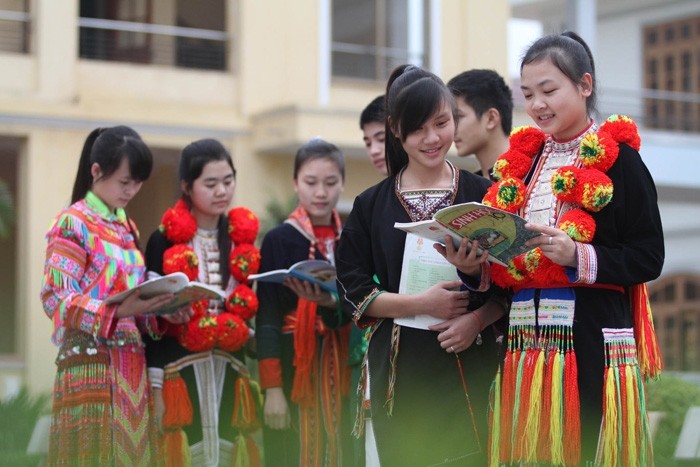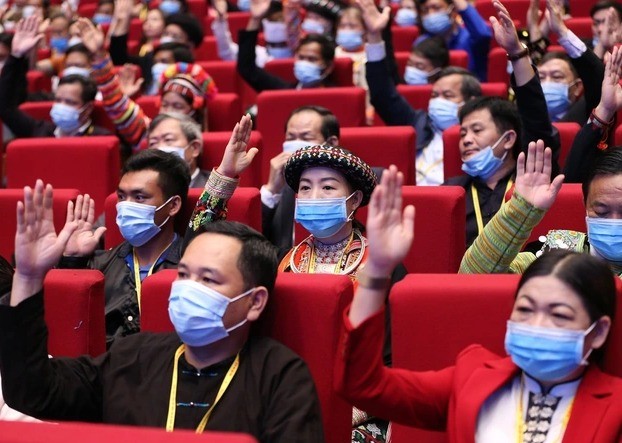
Vietnam strives to promote rights of ethnic minorities under framework of CERD Convention
Latest
 |
| Vietnam is achieving many impressive achievements in ensuring the rights of ethnic minorities, thereby contributing to promoting the country's prestige in implementing international commitments, especially the CERD Convention. (Source: CPV) |
The fifth milestone
Established in 1965, the Convention on the Elimination of All Forms of Racial Discrimination (CERD) condemns racial discrimination and obliges member states to adopt policies aimed at eliminating all forms of racial discrimination based on race, skin color, lineage, ethnicity or minority origin.
Vietnam has joined the CERD Convention since 1982 and successfully defended the National Report of CERD Convention four times in 1983, 1993, 2000 and 2012. This is an opportunity for Vietnam to promote its achievements in protecting human rights.
To maintain that momentum, Vietnam has actively implemented the 5th National Report of CERD Convention. This is a report on legislative, administrative, judicial and other measures, as well as achievements in protecting human rights and ethnic minorities in Vietnam, at the same time, combating against discriminatory acts in the 2013-2019 period.
On this basis, Vietnam has internalized international treaties and cemented legal regulations to ensure political, economic, social and cultural rights of ethnic minorities.
Consistent policy
There are 36 articles in Chapter II of the Vietnamese Constitution stipulating "human rights, basic rights and obligations of citizens", including the rights of ethnic minorities, as well as regulations on ensuring rights for ethnic minorities.
From 2013 to 2019, among 53 legal documents ensuring the rights of ethnic minorities, there were 12 new laws promulgated since 2012. Ensuring comprehensively economic, cultural, social, political and civil rights for all peoples is a testament to the right to self-determination of peoples within the great family of ethnic groups in Vietnam.
The consistent policy of Vietnam is to ensure equality, solidarity, respect among ethnic groups; all ethnic groups, regardless of majority or minority, high or low level of development, are equal in rights and obligations in all areas of social life and are guaranteed by the Constitution and law.
Outstanding achievements
In recent years, Vietnam has always valued the right of ethnic minorities to participate in the political system, especially the National Assembly. Therefore, the 1992 Constitution and the 2013 Constitution have added many important contents to ensure the voting and candidacy rights of ethnic minorities.
In addition, the socio-economic foundation in mountainous areas in recent years has developed positively, with a higher growth rate than before. Specifically, the governmental policies have helped more than 2 million ethnic minority households in mountainous areas escape poverty, created jobs for more than 162 thousand workers (more than 16 thousand workers working abroad within a limited time).
 |
| Currently, 52 out of 54 ethnic groups have representatives participating in the National Assembly through different sessions. (Photo: VNA) |
In order to eliminate the educational gap, the government implements many guidelines and policies to develop education for mountainous ethnic minorities. For example, in remote areas, the government enacts policies to support tuition exemption and reduction.
Besides, to ensure that peoples have the right to use its language, preserve its cultural identity, promote its good customs and traditions, the government pays great attention to supporting the teaching and learning of ethnic minority languages.
Currently, Vietnam officially implements teaching and learning of 6 ethnic minority languages (with programs and textbooks issued by the Ministry of Education and Training) namely H'Mong, Cham, Khmer, Jrai, Ba Na and Ede in 23 provinces and cities nationwide with 715 schools, 4,812 classes, and 113,231 students.
Thus, it can be concluded that Vietnam has always respected and guaranteed the rights of ethnic minorities, especially since Vietnam joined the CERD Convention in 1982. Vietnam always strives to improve the legal system, mobilize resources to ensure equality, solidarity, and harmonious settlement of relations between ethnic groups, creating changes in economic, cultural and social development in ethnic minority areas.
In order to better fulfill its role as a member of the Convention, Vietnam commits to promoting propaganda, education, and raising awareness about the Convention throughout the country and in mountainous ethnic minority areas. In addition, Vietnam strengthens international cooperation on the implementation of the Convention to share experiences in ensuring the rights of ethnic minorities and combating all forms of discrimination.

















